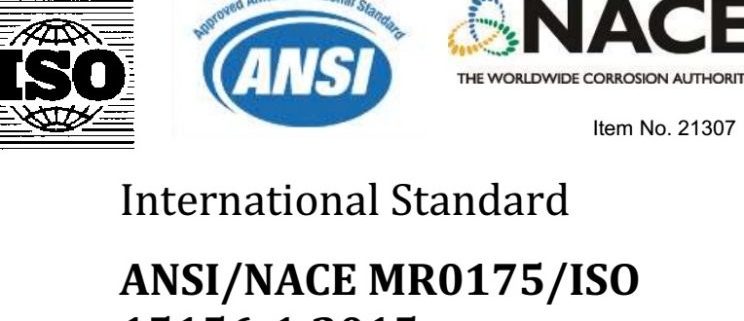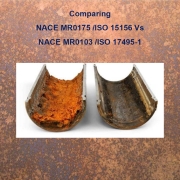What is NACE MR0175/ISO 15156?
NACE MR0175/ISO 15156 is a globally recognized standard that provides guidelines for selecting materials resistant to sulfide stress cracking (SSC) and other forms of hydrogen-induced cracking in environments containing hydrogen sulfide (H₂S). This standard is essential for ensuring the reliability and safety of equipment used in the oil and gas industry, particularly in sour service environments.
Critical Aspects of NACE MR0175/ISO 15156
- Scope and Purpose:
- The standard addresses the selection of materials for equipment used in oil and gas production that are exposed to environments containing H₂S, which can cause various forms of cracking.
- It aims to prevent material failure due to sulfide stress, corrosion, hydrogen-induced cracking, and other related mechanisms.
- Material Selection:
- This guide provides guidelines for selecting suitable materials, including carbon steels, low-alloy steels, stainless steels, nickel-based alloys, and other corrosion-resistant alloys.
- Specifies the environmental conditions and stress levels each material can withstand without experiencing cracking.
- Qualification and Testing:
- This paper outlines the necessary testing procedures for qualifying materials for sour service, including laboratory tests that simulate the corrosive conditions found in H₂S environments.
- Specifies the criteria for acceptable performance in these tests, ensuring that materials resist cracking under specified conditions.
- Design and Fabrication:
- Includes recommendations for designing and fabricating equipment to minimize the risk of hydrogen-induced cracking.
- Emphasizes the importance of manufacturing processes, welding techniques, and heat treatments that can affect the material’s resistance to H₂S-induced cracking.
- Maintenance and Monitoring:
- Advises on the maintenance practices and monitoring strategies to detect and prevent cracking in service.
- Regular inspections and non-destructive testing methods are recommended to ensure the ongoing integrity of equipment.
Importance in the Industry
- Safety: Ensures the safe operation of equipment in sour service environments by reducing the risk of catastrophic failures due to cracking.
- Reliability: Enhances the reliability and longevity of equipment, reducing downtime and maintenance costs.
- Compliance: Helps companies comply with regulatory requirements and industry standards, avoiding legal and financial repercussions.
NACE MR0175/ISO 15156 is divided into three parts, each focusing on different aspects of selecting materials for use in sour service environments. Here’s a more detailed breakdown:
Part 1: General Principles for Selection of Cracking-Resistant Materials
- Scope: Provides overarching guidelines and principles for selecting materials resistant to cracking in H₂S-containing environments.
- Content:
- Defines key terms and concepts related to sour service environments and material degradation.
- Outlines general criteria for assessing the suitability of materials for sour service.
- Describes the importance of considering environmental factors, material properties, and operational conditions when selecting materials.
- Provides a framework for performing risk assessments and making informed material selection decisions.
Part 2: Cracking-Resistant Carbon and Low-Alloy Steels and the Use of Cast Irons
- Scope: This paper focuses on the requirements and guidelines for using carbon steels, low-alloy steels, and cast irons in sour service environments.
- Content:
- Details the specific conditions under which these materials can be used safely.
- Lists the mechanical properties and chemical compositions required for these materials to resist sulfide stress cracking (SSC) and other forms of hydrogen-induced damage.
- Provides guidelines for the heat treatment and fabrication processes that can enhance the resistance of these materials to cracking.
- Discusses the necessity of proper material testing and qualification procedures to ensure compliance with the standard.
Part 3: Cracking-Resistant CRAs (Corrosion-Resistant Alloys) and Other Alloys
- Scope: Addresses corrosion-resistant alloys (CRAs) and other specialty alloys in sour service environments.
- Content:
- Identifies various types of CRAs, such as stainless steels, nickel-based alloys, and other high-performance alloys, and their suitability for sour service.
- Specifies the chemical compositions, mechanical properties, and heat treatments required for these materials to resist cracking.
- Provides guidelines for selecting, testing, and qualifying CRAs to ensure their performance in H₂S environments.
- This paper discusses the importance of considering both the corrosion resistance and mechanical properties of these alloys when selecting materials for specific applications.
NACE MR0175/ISO 15156 is a comprehensive standard that helps ensure materials’ safe and effective use in sour service environments. Each part addresses different categories of materials and provides detailed guidelines for their selection, testing, and qualification. By following these guidelines, companies can reduce the risk of material failure and enhance the safety and reliability of their operations in H₂S-containing environments.







